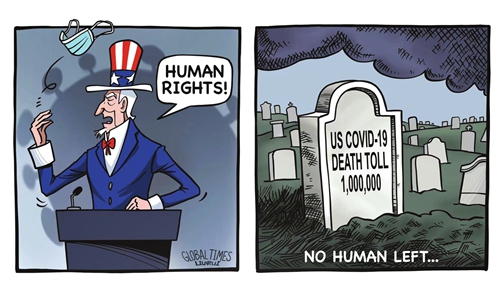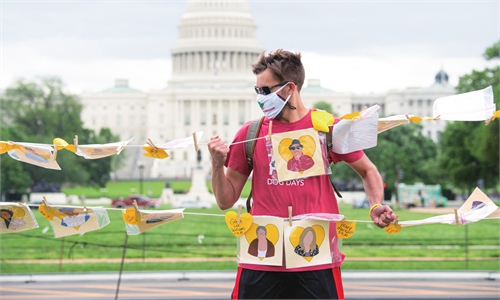IN-DEPTH / IN-DEPTH
GT Investigates: West ignores scientific wisdom with premature reopening, most vulnerable left to die
Editor's Note:
Western countries, one by one, have scrapped their COVID-19 restrictions and purported to be ready to "return to normalcy." Yet as the coronavirus continues to mutate, from the deadly Delta variant to the more contagious, milder Omicron variant, what can such a rush to re-open really bring the West in the post-pandemic era? After analyzing data and talking to epidemiologists, the Global Times conducted a series of investigative reports into what consequences vulnerable groups, including the elderly, minorities and children would bear when their countries ease COVID-19 restrictions, and what impact such moves would wreak onto their medical system. This is the first of such installment, looking into the shocking impact of Western countries' easing of anti-epidemic restrictions on their aged population.
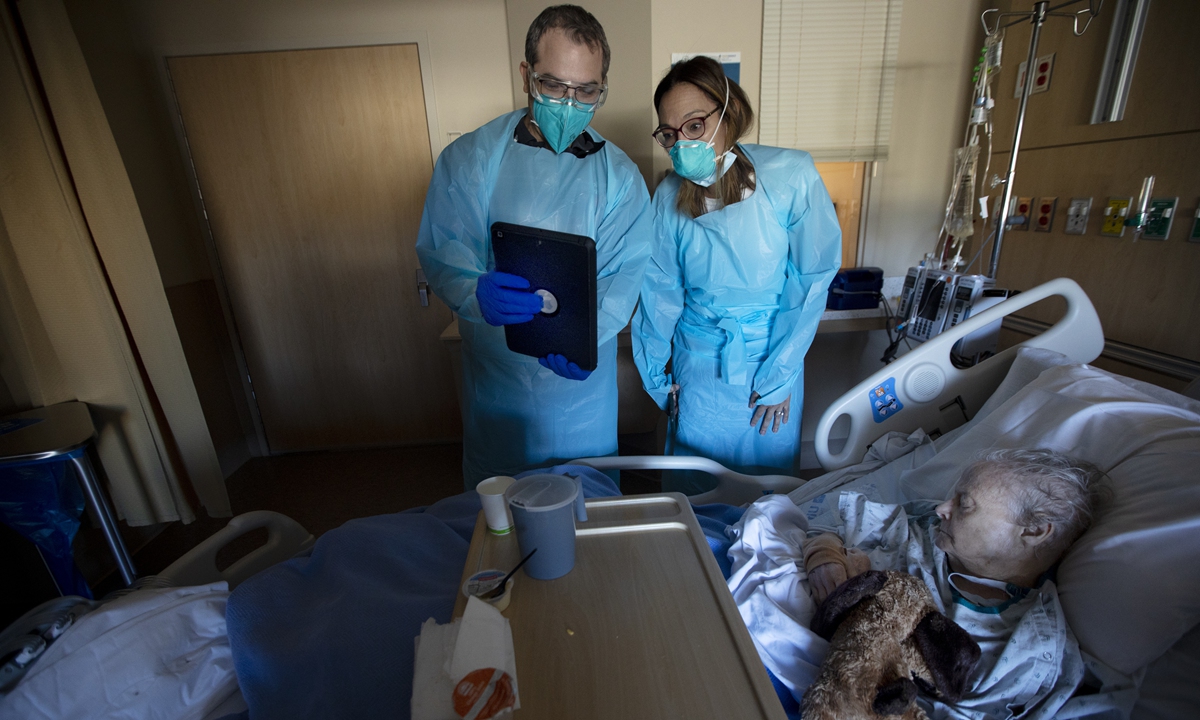
Brushing off health experts' continuous warnings that the pandemic is not yet over, Western countries, one by one, have scrapped off their COVID-19 travel restrictions. Many epidemiologists warn that such countries are exposing their most vulnerable groups including senior citizens, to tremendous risks, because many countries have since reported an uptick in the hospitalization of this group, even with the spreading of the milder Omicron variant; and the danger of evolving coronavirus variants may cause infection surges and deaths among this group considering their generally weak immune system.
China is determined to shun away from the West's grand "vanity project" of premature reopening, as the country has to offer protection for its largely unvaccinated group of senior citizens, said epidemiologists, noting that the country will only cautiously ease COVID-19 restrictions after an acceptable number of aged people are inoculated, thus proving that a rush re-opening, which leads to hundreds of thousands of deaths, is not the only way out of this pandemic.
Marta Balentine, a 67-year-old in Bergamo, Italy, was thinking about moving to South Italy with her daughter for a while, after she found out that several of her neighbors had tested positive for coronavirus. "They [those infected] just stay home and quarantine, and do not think it is a serious issue because they had a couple of days of a sore throat… for me, I don't think Omicron is just a flu, we need to be careful," she told the Global Times.
Living in Italy's most COVID-19-ravaged city, Balentine was deeply traumatized by the COVID-19 aftermath. "Two years ago, politicians were on television saying 'COVID is a flu' or even organized public aperitif events to say "Italy doesn't stop". Three weeks later, Bergamo's crematoriums were unable to cope anymore."
Italy was once the hotspot of the COVID-19 outbreak. An analysis from Statista, an online data portal, on the individuals who died in Italy after contracting coronavirus revealed that the vast majority of deaths occurred among the elderly. Of the 160,000 coronavirus deaths that are the subject of this study, almost 85 percent of fatalities registered were patients aged 70 years and older.
Now with the uptick of vaccinations among elderly and the Omicron variant becoming less severe, Italy, along with many other Western countries, has chosen to ease its COVID-19 restrictions and return to "normalcy." Yet this is a far dimmer "normalcy" compared with the pre-pandemic era.
Reuters reported in January that as Omicron swept the country since late 2021, cases in Italian hospitals started to plateau with the majority of the hospitalized being unvaccinated senior citizens and those who had not received a booster shot.
In the US, a much grimmer picture is on display. The country's death toll is approaching 1 million, according to the data from Johns Hopkins University. According to data, 75 percent of people who have died of the virus in the US - or about 600,000 of the nearly 800,000 who have perished thus far — have been 65 or older. One in every 100 older Americans has died from the virus, US media reported.
Yet the US has touted the easing of most COVID-19 restrictions since 2021. Health experts have repeatedly warned that a rushed re-opening may further expose the elderly to COVID-19 risks.
Similar to Italy, even with the less deadly Omicron variant, US hospitals still struggled to cope with case surges in January, with at least 80 percent of staffed hospital beds in 24 states occupied, according to media reports.
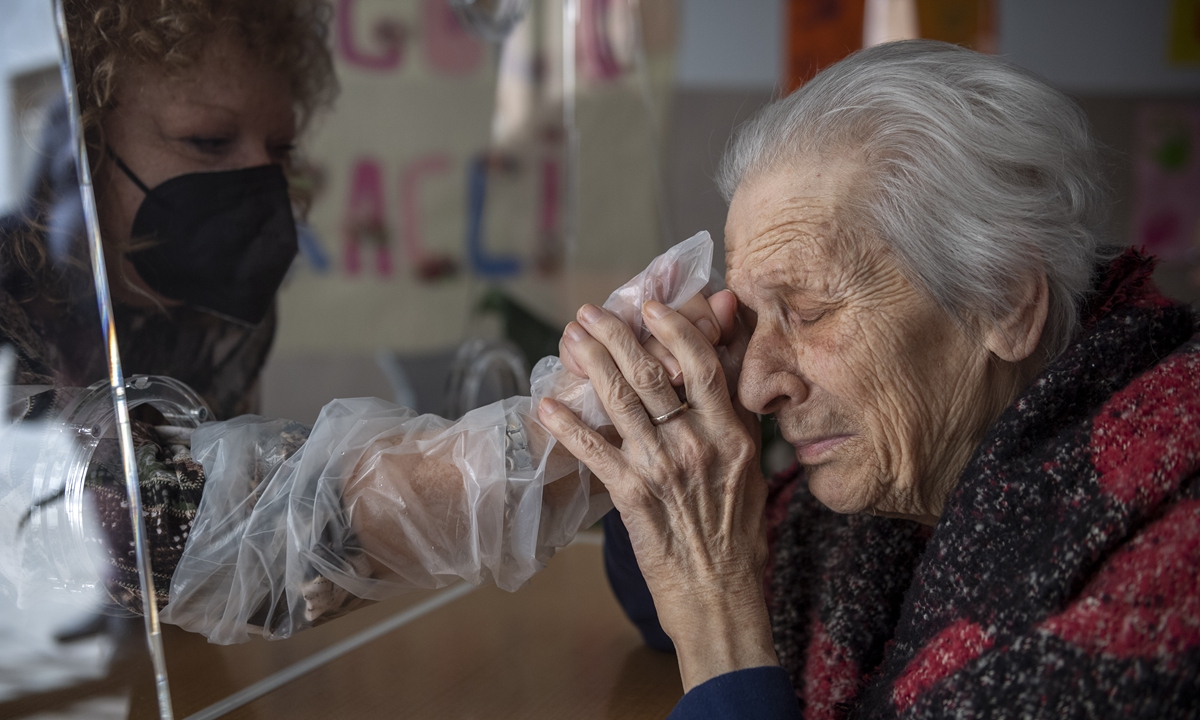
Alarming data shows an "uptick" in hospital admissions, Paul Elliot, director of Imperial College London's React program said, Sky News reported.
Dr Jenny Harries, chief executive of the UK Health Security Agency (UKHSA) also said "the increasing presence of the BA.2 sub-lineage of Omicron and the recent slight increase in infections in those over 55 show that the pandemic is not over and that we can expect to see COVID circulating at high levels," according to the report.
On Friday, the Biden administration is warned that the US could see as many as 100 million coronavirus infections and a potentially significant wave of deaths this fall and winter, driven by new omicron subvariants that have shown a remarkable ability to evade immunity.
Heavy blow
Although the US has seen a relatively high vaccination among the older population, the easing of COVID-19 restrictions brings immense risks to the elderly because the vaccines may not be efficacious for those who suffer from underlying conditions, Chen Xi, an associated professor of public health at Yale University, told the Global Times.
Chen noted this is why many healthcare experts are warning that the pandemic is not yet over; "if we let our guard down, the spillover effect of a COVID-19 outbreak will hit aged people hard."
According to Debora MacKenzie, a leading science journalist who currently lives in France, COVID-19 is much worse than the common flu because it's more virulent and much more dangerous. "If you caught COVID[-19] before vaccination, you would be on average 10 times more likely to die than if you caught the flu. If you were over 60, you would be 20 times more likely to die from COVID[-19] than the flu," she said.
In addition, MacKenzie highlighted "long COVID" as a substantial difference between COVID-19 and flu. The term "long COVID" is commonly used to describe symptoms such as persistent fatigue, breathlessness, and brain fog which continue or develop after an acute COVID-19 diagnosis.
One in three people who survived COVID-19 now suffers from long COVID, a study published by the US Centers for Disease Control and Prevention revealed.
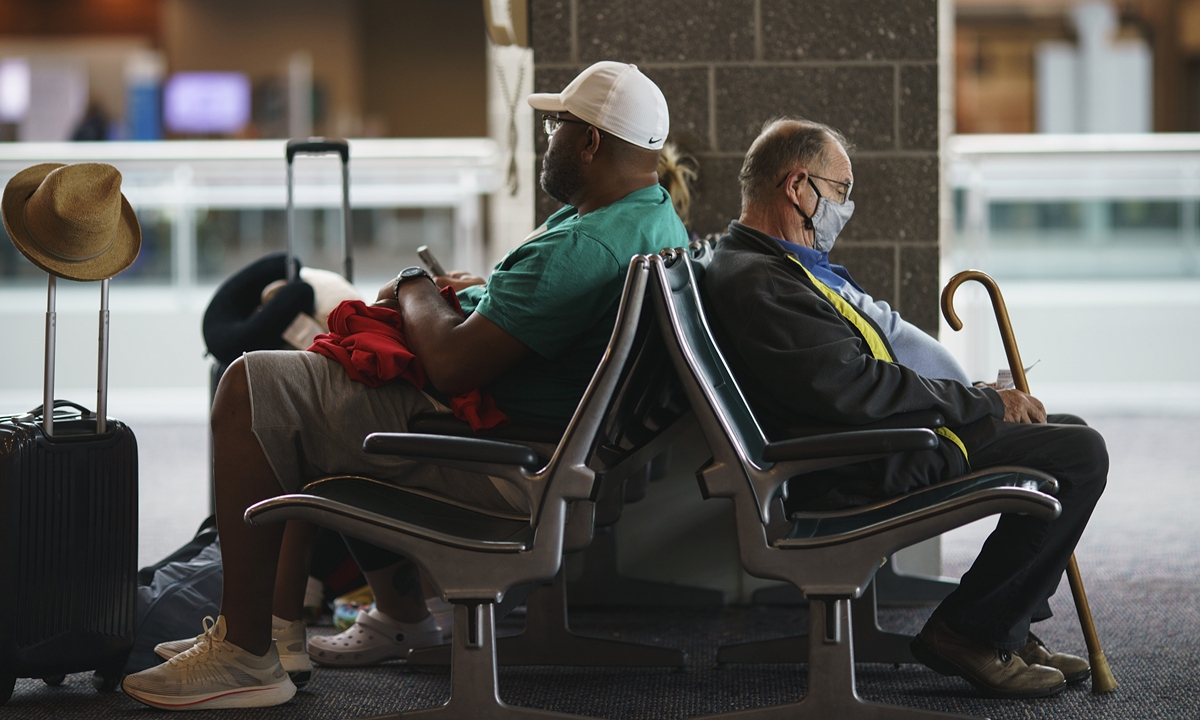
Robert Wachter, a professor and the chair of the Department of Medicine at the University of California, San Francisco, admitted the fact that "The better vaccinated you are, the more likely you are to have a very mild case." Yet, "that's part of the challenge" when it comes to some older adults whose "level of reserve is less," said Wachter, according to AARP, a US-based nonprofit organization dedicated to older people.
A flu-like illness might sideline a healthy 40-year-old for a few days, but for someone who is older and frailer, it could trigger a loss of appetite or a state of delirium that spirals into something more serious, Wachter explained.
"It might be enough to tip them over."
The burden continues
In addition to psychiatric risks, physiological risk factors are another COVID-19 burden borne by senior citizens.
"Even if everything is open and life 'returns to normal,' I still don't see my children like we used to and can't be as social with friends, because I believe the pandemic is not over, and there may be more deadly variants. Certainly I don't want to be a risk to my family and friends," 72-year-old old Claudio Salvatore from Italy told the Global Times.
Salvatore said he now lives separately from his two sons who have already gone back to work and have largely resumed normal life. "I haven't seen them for three months. Without the restrictions, we [aged people] have to protect ourselves, and for the good of our children."
The New York Times also reported in December 2021 that elderly people in the US worried about their exposure factor, and the ongoing warnings from health officials about the added dangers to older people, many of them are still curtailing travel and visits with grandchildren, and are dining out less.
"I don't think it [the pandemic] is over. For us old people, the risk is still here and will be for a long time," said Michael Kofer, a 69-year-old American.
A better way out
China, meanwhile, which reported a small fraction of the international death toll, with the mainland accounting for about 5,100 in two years since the outbreak began, has vowed to side-step the awful precedence as shown by the West, by sticking to the zero-COVID policy.
Health experts pointed out that the strategy is the only way to prevent the tragedy in the West from happing in China, where 18.7 percent of the population is above 60 years old, and 59 percent of who have received booster shots.
"Why did the West see such high rates of vaccination? It was a life lesson. Many of them rushed to get vaccinated after learning that their friends and relatives died because of the virus," Zeng Guang, a former chief epidemiologist at China's Centers for Disease Control and Prevention, told the Global Times, noting that the low vaccination rate in the Chinese mainland and Hong Kong is due to the relatively good protection offered to this vulnerable group in the past two years.
"They just don't feel the urgency of getting vaccinated," said Zeng, pointing to Hong Kong's handling of the fifth outbreak also as a lesson to the mainland.
Hong Kong reported one of the highest mortality rates worldwide due to the Omicron variant onslaught. A total of 90 percent of deaths involved people who were not fully vaccinated, and only about one-third of those aged over 80 in the city had been fully vaccinated.
Until Monday, a total of 553 people had died in Shanghai due to the current COVID-19 outbreak, most of whom suffered from underlying medical conditions which directly led to their deaths.
Zhang Wenhong, head of the infectious disease department at Huashan Hospital in Shanghai, and also the director of the National Center for Infectious Diseases said in April that the Omicron variant is not just a big flu, it still affects people, and the unvaccinated elderly are the most directly affected. He also emphasized that at the current stage, the country can offer adequate protection for senior citizens through the zero-COVID strategy and encouraging them to get vaccinated and boosted.
He said that the biggest experience we can draw through the current dynamic zero practice is that we should be well prepared for the next stage of COVID-19 fight, including inoculating aged people, stockpiling relevant medication, enhancing nucleic acid testing capacities, and perfecting our medical system for diagnosis and treatment. "If there is no strong system for fighting COVID-19, even if we achieve zero COVID in communities this time, we will still encounter problems in the future," said Zhang.
China will not risk a premature reopening strategy which could lead to hundreds of thousands of deaths, said Zeng, noting China's practice will prove the hasty re-opening is not the only way out of this pandemic.
Western countries, one by one, have scrapped their COVID-19 restrictions and purported to be ready to "return to normalcy." Yet as the coronavirus continues to mutate, from the deadly Delta variant to the more contagious, milder Omicron variant, what can such a rush to re-open really bring the West in the post-pandemic era? After analyzing data and talking to epidemiologists, the Global Times conducted a series of investigative reports into what consequences vulnerable groups, including the elderly, minorities and children would bear when their countries ease COVID-19 restrictions, and what impact such moves would wreak onto their medical system. This is the first of such installment, looking into the shocking impact of Western countries' easing of anti-epidemic restrictions on their aged population.

A doctor and a clergyman check an aged COVID-19 patient in California on December 3, 2020. Photo: VCG
As the West is embracing "normalcy" with bars full of unmasked revelers, beaches awash with sunbathers from home and abroad, it seems they cannot wait to walk out of the COVID-19 pandemic shadow. But are they forgetting something?Brushing off health experts' continuous warnings that the pandemic is not yet over, Western countries, one by one, have scrapped off their COVID-19 travel restrictions. Many epidemiologists warn that such countries are exposing their most vulnerable groups including senior citizens, to tremendous risks, because many countries have since reported an uptick in the hospitalization of this group, even with the spreading of the milder Omicron variant; and the danger of evolving coronavirus variants may cause infection surges and deaths among this group considering their generally weak immune system.
China is determined to shun away from the West's grand "vanity project" of premature reopening, as the country has to offer protection for its largely unvaccinated group of senior citizens, said epidemiologists, noting that the country will only cautiously ease COVID-19 restrictions after an acceptable number of aged people are inoculated, thus proving that a rush re-opening, which leads to hundreds of thousands of deaths, is not the only way out of this pandemic.
Marta Balentine, a 67-year-old in Bergamo, Italy, was thinking about moving to South Italy with her daughter for a while, after she found out that several of her neighbors had tested positive for coronavirus. "They [those infected] just stay home and quarantine, and do not think it is a serious issue because they had a couple of days of a sore throat… for me, I don't think Omicron is just a flu, we need to be careful," she told the Global Times.
Living in Italy's most COVID-19-ravaged city, Balentine was deeply traumatized by the COVID-19 aftermath. "Two years ago, politicians were on television saying 'COVID is a flu' or even organized public aperitif events to say "Italy doesn't stop". Three weeks later, Bergamo's crematoriums were unable to cope anymore."
Italy was once the hotspot of the COVID-19 outbreak. An analysis from Statista, an online data portal, on the individuals who died in Italy after contracting coronavirus revealed that the vast majority of deaths occurred among the elderly. Of the 160,000 coronavirus deaths that are the subject of this study, almost 85 percent of fatalities registered were patients aged 70 years and older.
Now with the uptick of vaccinations among elderly and the Omicron variant becoming less severe, Italy, along with many other Western countries, has chosen to ease its COVID-19 restrictions and return to "normalcy." Yet this is a far dimmer "normalcy" compared with the pre-pandemic era.
Reuters reported in January that as Omicron swept the country since late 2021, cases in Italian hospitals started to plateau with the majority of the hospitalized being unvaccinated senior citizens and those who had not received a booster shot.
In the US, a much grimmer picture is on display. The country's death toll is approaching 1 million, according to the data from Johns Hopkins University. According to data, 75 percent of people who have died of the virus in the US - or about 600,000 of the nearly 800,000 who have perished thus far — have been 65 or older. One in every 100 older Americans has died from the virus, US media reported.
Yet the US has touted the easing of most COVID-19 restrictions since 2021. Health experts have repeatedly warned that a rushed re-opening may further expose the elderly to COVID-19 risks.
Similar to Italy, even with the less deadly Omicron variant, US hospitals still struggled to cope with case surges in January, with at least 80 percent of staffed hospital beds in 24 states occupied, according to media reports.

A resident of the Villa Sacra Famiglia Nursing home, Anna (right) hugs her daughter through a plastic screen in the so-called Hug Room, during the COVID-19 pandemic on February 24, 2021 in Rome, Italy. Photo: VCG
Alarming data shows an "uptick" in hospital admissions, Paul Elliot, director of Imperial College London's React program said, Sky News reported.
Dr Jenny Harries, chief executive of the UK Health Security Agency (UKHSA) also said "the increasing presence of the BA.2 sub-lineage of Omicron and the recent slight increase in infections in those over 55 show that the pandemic is not over and that we can expect to see COVID circulating at high levels," according to the report.
On Friday, the Biden administration is warned that the US could see as many as 100 million coronavirus infections and a potentially significant wave of deaths this fall and winter, driven by new omicron subvariants that have shown a remarkable ability to evade immunity.
Heavy blow
Although the US has seen a relatively high vaccination among the older population, the easing of COVID-19 restrictions brings immense risks to the elderly because the vaccines may not be efficacious for those who suffer from underlying conditions, Chen Xi, an associated professor of public health at Yale University, told the Global Times.
Chen noted this is why many healthcare experts are warning that the pandemic is not yet over; "if we let our guard down, the spillover effect of a COVID-19 outbreak will hit aged people hard."
According to Debora MacKenzie, a leading science journalist who currently lives in France, COVID-19 is much worse than the common flu because it's more virulent and much more dangerous. "If you caught COVID[-19] before vaccination, you would be on average 10 times more likely to die than if you caught the flu. If you were over 60, you would be 20 times more likely to die from COVID[-19] than the flu," she said.
In addition, MacKenzie highlighted "long COVID" as a substantial difference between COVID-19 and flu. The term "long COVID" is commonly used to describe symptoms such as persistent fatigue, breathlessness, and brain fog which continue or develop after an acute COVID-19 diagnosis.
One in three people who survived COVID-19 now suffers from long COVID, a study published by the US Centers for Disease Control and Prevention revealed.

Travelers sit in a waiting area at Rhode Island T.F. Green International Airport on April 19, 2022, after a federal judge's decision to strike down a national mask mandate. Photo: VCG
Robert Wachter, a professor and the chair of the Department of Medicine at the University of California, San Francisco, admitted the fact that "The better vaccinated you are, the more likely you are to have a very mild case." Yet, "that's part of the challenge" when it comes to some older adults whose "level of reserve is less," said Wachter, according to AARP, a US-based nonprofit organization dedicated to older people.
A flu-like illness might sideline a healthy 40-year-old for a few days, but for someone who is older and frailer, it could trigger a loss of appetite or a state of delirium that spirals into something more serious, Wachter explained.
"It might be enough to tip them over."
The burden continues
In addition to psychiatric risks, physiological risk factors are another COVID-19 burden borne by senior citizens.
"Even if everything is open and life 'returns to normal,' I still don't see my children like we used to and can't be as social with friends, because I believe the pandemic is not over, and there may be more deadly variants. Certainly I don't want to be a risk to my family and friends," 72-year-old old Claudio Salvatore from Italy told the Global Times.
Salvatore said he now lives separately from his two sons who have already gone back to work and have largely resumed normal life. "I haven't seen them for three months. Without the restrictions, we [aged people] have to protect ourselves, and for the good of our children."
The New York Times also reported in December 2021 that elderly people in the US worried about their exposure factor, and the ongoing warnings from health officials about the added dangers to older people, many of them are still curtailing travel and visits with grandchildren, and are dining out less.
"I don't think it [the pandemic] is over. For us old people, the risk is still here and will be for a long time," said Michael Kofer, a 69-year-old American.
A better way out
China, meanwhile, which reported a small fraction of the international death toll, with the mainland accounting for about 5,100 in two years since the outbreak began, has vowed to side-step the awful precedence as shown by the West, by sticking to the zero-COVID policy.
Health experts pointed out that the strategy is the only way to prevent the tragedy in the West from happing in China, where 18.7 percent of the population is above 60 years old, and 59 percent of who have received booster shots.
"Why did the West see such high rates of vaccination? It was a life lesson. Many of them rushed to get vaccinated after learning that their friends and relatives died because of the virus," Zeng Guang, a former chief epidemiologist at China's Centers for Disease Control and Prevention, told the Global Times, noting that the low vaccination rate in the Chinese mainland and Hong Kong is due to the relatively good protection offered to this vulnerable group in the past two years.
"They just don't feel the urgency of getting vaccinated," said Zeng, pointing to Hong Kong's handling of the fifth outbreak also as a lesson to the mainland.
Hong Kong reported one of the highest mortality rates worldwide due to the Omicron variant onslaught. A total of 90 percent of deaths involved people who were not fully vaccinated, and only about one-third of those aged over 80 in the city had been fully vaccinated.
Until Monday, a total of 553 people had died in Shanghai due to the current COVID-19 outbreak, most of whom suffered from underlying medical conditions which directly led to their deaths.
Zhang Wenhong, head of the infectious disease department at Huashan Hospital in Shanghai, and also the director of the National Center for Infectious Diseases said in April that the Omicron variant is not just a big flu, it still affects people, and the unvaccinated elderly are the most directly affected. He also emphasized that at the current stage, the country can offer adequate protection for senior citizens through the zero-COVID strategy and encouraging them to get vaccinated and boosted.
He said that the biggest experience we can draw through the current dynamic zero practice is that we should be well prepared for the next stage of COVID-19 fight, including inoculating aged people, stockpiling relevant medication, enhancing nucleic acid testing capacities, and perfecting our medical system for diagnosis and treatment. "If there is no strong system for fighting COVID-19, even if we achieve zero COVID in communities this time, we will still encounter problems in the future," said Zhang.
China will not risk a premature reopening strategy which could lead to hundreds of thousands of deaths, said Zeng, noting China's practice will prove the hasty re-opening is not the only way out of this pandemic.
